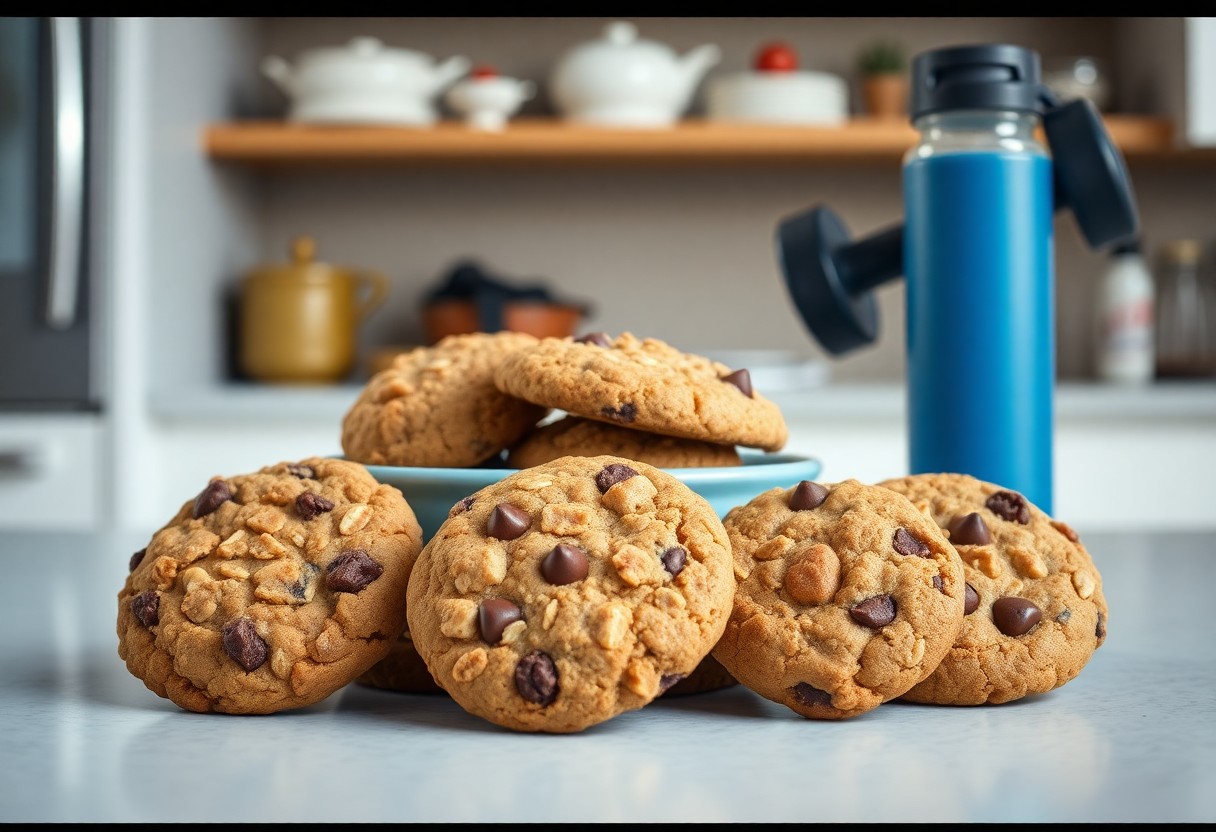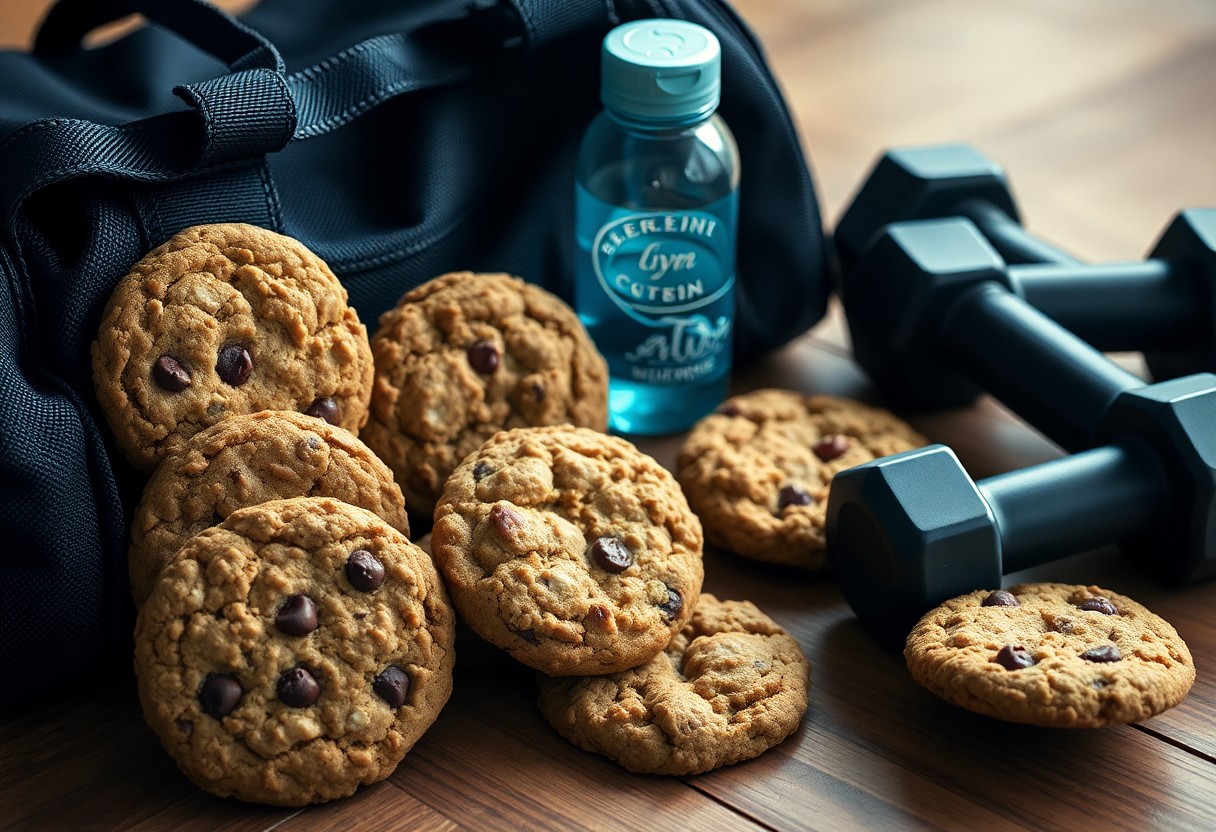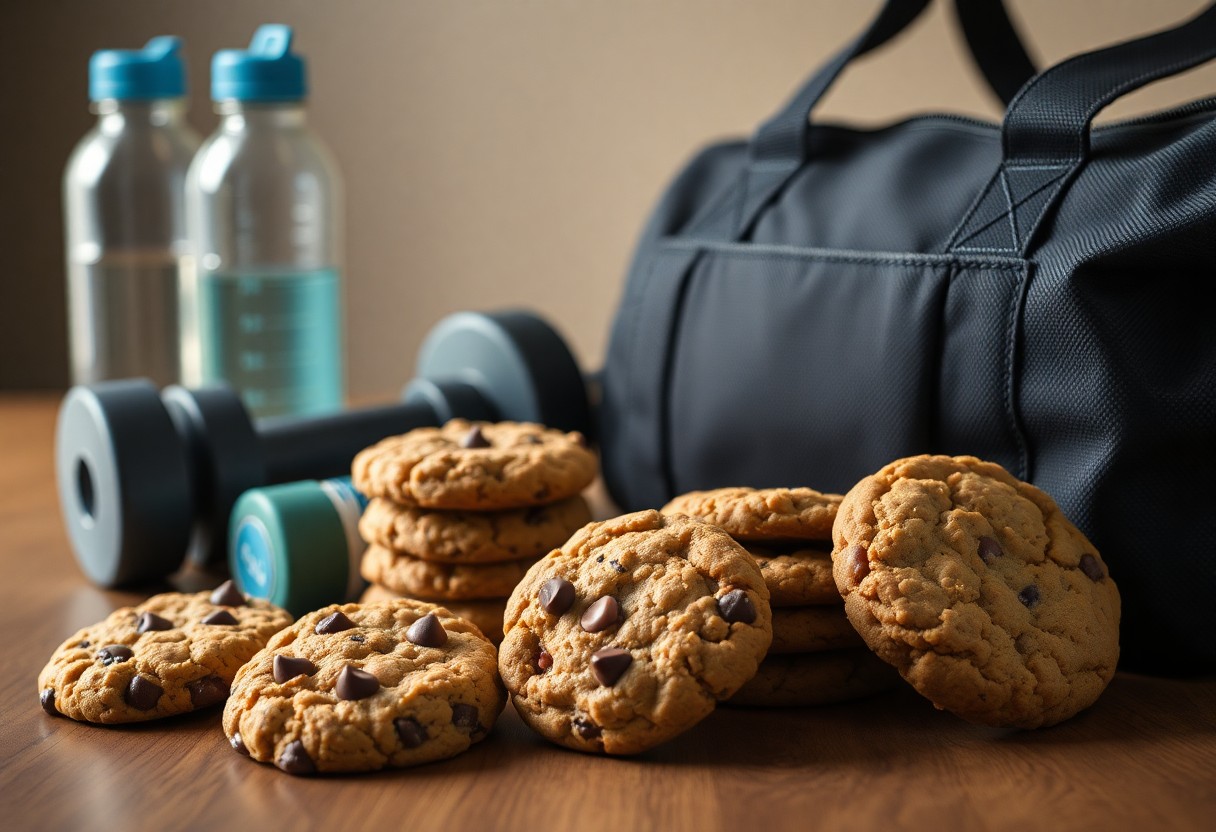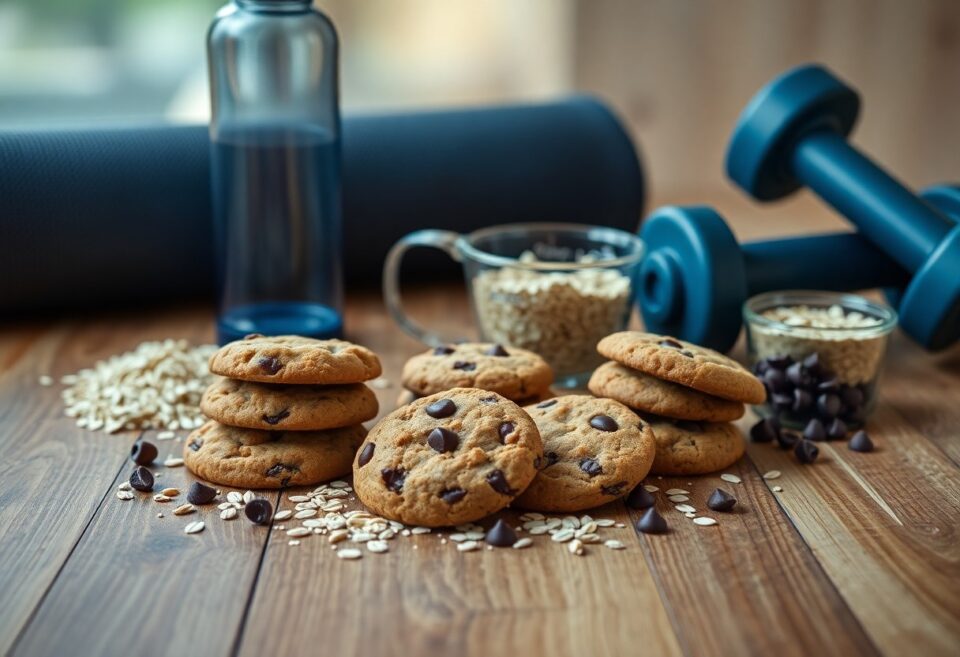Many people overlook cookies as a viable workout snack, but you might be surprised to learn they can be an excellent source of energy before or after exercise. When chosen wisely, cookies provide a balanced mix of carbohydrates, proteins, and healthy fats that help boost your stamina and aid recovery. In this guide, you’ll discover how including cookies in your routine can support your fitness goals, enhance performance, and satisfy cravings without guilt. Plus, you’ll find delicious recipes to create your own nutritious workout fuel at home.

The Nutritional Powerhouse: What Makes Cookies Great Workout Fuel?
Cookies, when crafted with the right ingredients, can be a remarkably balanced source of post-workout nutrition. The composition of these baked treats often aligns with the nutritional needs your body demands after an intense session. For example, a cookie containing oats, nuts, and dried fruits packs a diverse array of nutrients—each element playing a role in replenishing your energy stores, repairing muscles, and restoring electrolyte balance. Unlike a simple snack, these cookies offer a synergy of macro and micronutrients that streamline your recovery process.
Furthermore, the portability and convenience of cookies make them a practical choice for athletes and fitness enthusiasts alike. Unlike bulky meals or complicated protein shakes, you can easily carry cookies and consume them on the go, making them incredibly useful immediately after workouts or during busy schedules. Additionally, several cookies are fortified with added vitamins and minerals, such as magnesium or calcium, to support muscle function and bone health—you’d be surprised how this simple snack can deliver complex nutritional benefits.
The customization potential also stands out—whether you prefer plant-based proteins like pea or hemp incorporated into cookie recipes or opt for dairy-based whey protein enrichments, the cookie’s flexibility accommodates dietary preferences and restrictions. This adaptability ensures you get a nutrient-dense option that complements your specific workout goals, from muscle gain to endurance improvement, all within an appealing, easy-to-digest format.
Macronutrient Breakdown: Carbs, Proteins, and Fats
In terms of macronutrients, cookies can be a balanced blend of carbohydrates, proteins, and fats that cater precisely to post-exercise needs. Carbohydrates in cookies—often sourced from whole grains, oats, or natural sweeteners—deliver the glycogen replenishment your muscles require after depleting energy reserves. Complex carbs furthermore provide a sustained energy release, vital for prolonged recovery and reducing fatigue.
Proteins embedded in cookie recipes vary from plant-based isolates to animal-derived powders, supplying the amino acids necessary for muscle repair and growth. The protein content typically ranges between 8 to 15 grams per serving in workout-focused cookies, a quantity sufficient to kickstart muscle protein synthesis without overwhelming the digestive system. Combining proteins with carbs in a cookie facilitates more efficient glycogen refilling and muscle recovery than carbs alone.
Fats, frequently introduced through nuts, seeds, or coconut oil, contribute by supporting hormone production, including anabolic hormones like testosterone, vital for muscle repair. Beyond hormone regulation, healthy fats also aid in reducing inflammation and improving joint health, which supports consistent training. These fats tend to be predominantly unsaturated, aligning with heart-healthy dietary patterns that benefit overall athletic performance.
The Role of Sugars and Fiber in Recovery
Sugars in workout cookies go beyond mere sweetness—they provide fast-acting fuel to your muscles when consumed immediately after exercise. Simple sugars, such as those from honey or dried fruits, rapidly spike insulin levels to shuttle glucose and amino acids efficiently into muscle cells. This insulin response is one of the triggers for enhanced muscle glycogen storage, making sugars indispensable in after-training nutrition.
Fiber from sources like oats, chia seeds, and bran contributes a contrasting but equally important role. It moderates blood sugar spikes by slowing digestion, promoting a steadier release of energy over time, and supporting gut health. A well-functioning digestive system is vital for nutrient absorption, ensuring your body can effectively utilize every calorie in these cookies. Moreover, fiber fosters satiety, helping you avoid unhealthy snacking while your muscles rebuild.
The synergy of sugars and fiber allows these cookies to provide both immediate and sustained energy post-workout. Immediate energy kickstarts your recovery while fiber supports longer-term metabolic health, creating a nutritional balance seldom found in other quick snacks. This combination contributes to a more controlled glycemic response—keeping your energy levels stable and reducing the risk of mid-recovery crashes.
The interplay between sugars and fiber also impacts hydration status after exercise. Fiber-rich ingredients, like oats and flaxseed, absorb water and facilitate better fluid retention, which is vital when your body is recovering from sweat loss. Simultaneously, natural sugars stimulate insulin and cellular absorption of electrolytes, enhancing rehydration effectiveness. Together, these effects help restore your body’s equilibrium, enabling faster bounce-back and readiness for your next workout session.

The Science of Energy: How Cookies Fuel Your Workout Performance
Glycogen Stores and Pre-Workout Boost
Your muscles rely heavily on glycogen, a stored form of glucose, to provide energy during exercise. When you consume a cookie before your workout, especially one rich in carbohydrates, you’re effectively topping up these glycogen stores. This replenishment can help you maintain endurance, power, and overall performance. For example, a cookie with oats or whole grains can deliver a steady release of glucose into your bloodstream, optimizing energy availability throughout your session.
Cookies that contain a balance of simple and complex carbohydrates can supply both an immediate and sustained energy source. Simple sugars, like those from honey or dried fruits in your cookie, provide a quick spike in blood glucose, which is particularly beneficial if you plan to work out soon after eating. Meanwhile, complex carbs keep the energy coming in slowly, helping you avoid the mid-exercise slump. Studies have shown that consuming 30-60 grams of carbohydrates about an hour before exercise can significantly improve endurance performance, and a well-crafted cookie can be an easy, convenient way to hit that mark without weighing you down.
Besides carbohydrates, some cookies include small amounts of protein and fats that influence digestion speed and energy utilization. For example, adding nuts or seeds to your cookie can slightly slow glucose absorption, preventing a rapid blood sugar crash. This fine balancing act makes cookies a customizable pre-workout snack allowing you to tailor your energy strategy for your specific workout intensity and duration.
Quick Digestibility for Post-Workout Recovery
After a tough workout, your muscles are primed to absorb nutrients quickly to start the recovery process. Cookies, especially those made with simple sugars and a bit of protein, can deliver glucose to your system rapidly, aiding in replenishing glycogen stores that have been depleted during exercise. A cookie containing ingredients like honey, dried fruit, or white flour offers carbs that your body can digest almost instantly, kickstarting the refueling needed to restore your energy levels effectively.
The protein content in some cookies also plays a pivotal role in muscle repair. Adding sources like whey protein powder, nuts, or seeds helps provide the amino acids your muscles require to rebuild and grow stronger after stress. Clinical research has demonstrated that pairing carbohydrates with protein within the 30-minute window post-exercise maximizes glycogen synthesis and protein muscle repair, which means a protein-enriched cookie can serve as a practical and efficient recovery snack.
Your body’s insulin response following a workout is heightened, which enhances glucose uptake by muscle cells. Cookies with the right carb-to-protein ratio take advantage of this metabolic window, making your recovery more effective. The balance between quick-digesting carbs and moderate protein content in certain cookie recipes optimizes nutrient absorption without adding digestive discomfort, which sometimes happens with heavier post-workout meals.
Furthermore, the portable nature of cookies means you can refuel promptly after your session, even when you’re on the go. Unlike some traditional recovery foods that require preparation or refrigeration, cookies provide a practical, shelf-stable solution that doesn’t sacrifice nutritional benefit. This accessibility allows you to consistently support your recovery process no matter where your workout takes you.
Versatility Meets Convenience: Customizing Your Cookie Experience
Healthier Ingredient Substitutions for the Fitness-Focused
You can easily transform traditional cookie recipes into nutrient-dense, workout-friendly snacks by swapping out common ingredients for healthier alternatives. Instead of using all-purpose flour, consider almond flour or oat flour, both of which provide additional fiber and protein to support muscle recovery. These flours also have a lower glycemic index, helping maintain more stable blood sugar levels during your post-exercise refueling. Additionally, replacing refined sugar with natural sweeteners like mashed bananas, unsweetened applesauce, or pure maple syrup introduces gentle sweetness without the rapid sugar spikes that can compromise your energy balance.
Adding superfoods such as chia seeds, flaxseeds, or hemp hearts boosts the omega-3 content and fiber profile of your cookies, promoting better digestion and reducing inflammation after intense workouts. You might also consider incorporating protein powders—whey, pea, or hemp-based—to ensure your snack delivers crucial amino acids that aid muscle repair. Experimenting with nut butters like almond or cashew instead of butter not only enhances healthy fat intake but also adds richness and satiety, helping sustain your energy levels throughout the day.
Finally, you can increase the micronutrient content by mixing in finely chopped dried fruits or dark chocolate chips, which provide antioxidants beneficial for combating oxidative stress post-training. These substitutions don’t just make your cookies healthier; they create a balanced, nutrient-packed treat tailored specifically to the demands of your fitness routine. Adjusting the ratios and ingredients to suit your specific goals gives you full control over what fuels your body best.
Portable Snacking: Cookies on the Go
Cookies shine as a grab-and-go snack when you need a quick energy boost before or after your workout. Their compact size and durable texture make them ideal for tossing into your gym bag without worrying about spillage or refrigeration. Unlike liquids or powders, cookies don’t require special containers or preparation, making them an effortless option for busy schedules. You can prepare a batch in advance, portion them into single servings, and stash them in your car or locker for immediate fuel whenever hunger strikes.
Customizing cookies for portability involves focusing on ingredients that ensure shelf stability and nutrient retention. Incorporating natural binders like nut butters or mashed banana helps keep the cookies moist while preventing crumbliness that could lead to mess. Whole grains and fiber-rich components not only contribute to sustained energy release but also help maintain texture and freshness during transportation. Packaging them in reusable silicone bags or biodegradable wrappers minimizes waste while keeping your snack hygienic and accessible.
A study published in the Journal of Sports Nutrition highlighted how portable snacks with balanced macronutrients support consistent energy availability and quicker recovery in active individuals. With cookies tailored to your nutritional needs, whether higher in protein or complex carbs, you gain an on-demand source of energy that fits seamlessly into your active lifestyle. Integrating these versatile treats into your routine can transform how you fuel your body during unpredictable days and intense training cycles.
When you consider the practical advantages of portable cookies, you realize they’re not just tasty treats—they’re functional tools in your fitness arsenal. You’re able to hydrate and nourish your body on the move without sacrificing nutrition or convenience, facilitating better workout performance and recovery even during the busiest days.
Deliciously Energizing Recipes to Elevate Your Workout Routine
Classic Oatmeal Chocolate Chip Recovery Cookies
Oatmeal chocolate chip cookies offer an ideal balance of carbohydrates, fiber, and a touch of sweetness that makes them a go-to recovery snack after your workout. The oats provide steady energy release by stabilizing your blood sugar levels, while a moderate amount of chocolate chips deliver a quick but controlled surge of glucose to replenish glycogen stores swiftly. When baked with wholesome ingredients like whole grain oats and minimal refined sugar, these cookies can become a powerhouse treat without the guilt.
Each cookie typically packs around 150–180 calories, which includes approximately 20 grams of carbs and 3–4 grams of protein, making it just right to support muscle repair and sustained energy. The addition of baking powder and vanilla extract infuses them with a delightful aroma and texture, turning post-workout nutrition into a delightful experience. You can even customize the recipe by tossing in nuts or dried fruits to increase healthy fats and micronutrients, further enhancing their recovery benefits.
Scientific studies have shown that combining carbohydrates with a little protein within 30 minutes after exercising can significantly improve muscle glycogen resynthesis and recovery rates. Oatmeal chocolate chip cookies hit this nutritional sweet spot by offering rapid-absorbing carbs alongside nut-derived proteins and healthy fats if you include nuts. As a result, they not only taste indulgent but also work hard behind the scenes to prepare your body for the next training session.
Protein-Packed Peanut Butter Energy Bites
Peanut butter energy bites serve as another excellent option to fuel your workouts, especially when you’re short on time but need a nutrient-dense boost. By mixing peanut butter, protein powder, oats, honey, and flax seeds, these no-bake treats become compact sources of protein, healthy fats, and fiber that help sustain your endurance and muscle recovery. Each bite carries approximately 100–120 calories, including about 6–8 grams of protein, making it easy to tailor portions based on your specific energy and macro needs.
The presence of peanut butter in these energy bites provides you with a rich dose of monounsaturated fats and vital micronutrients like magnesium and vitamin E, which support muscle function and overall metabolic health. In addition, honey acts as a natural sweetener with antioxidants and electrolytes that aid hydration and recovery. Flax seeds contribute omega-3 fatty acids and lignans, which some studies link to reduced inflammation, further enhancing post-workout recovery and joint health.
Because these energy bites don’t require baking, they preserve the integrity of heat-sensitive nutrients in protein powder and seeds. This feature also makes them perfect for meal prepping—you can store them in your fridge for several days, ensuring you always have a convenient, energizing snack ready to go. Whether you’re headed to a morning run or an evening weightlifting session, protein-packed peanut butter energy bites offer a practical and tasty way to boost your workout fuel.
For even more customization, you can experiment by swapping traditional peanut butter with almond or cashew butter to vary flavor profiles and micronutrient content. Adding a pinch of cinnamon or cacao nibs can also enhance the antioxidant load while providing a nuanced taste. These tweaks allow you to tailor the recipe closely to your flavor preferences and workout demands, ensuring these bites become a staple in your nutrition arsenal.

Beyond the Cookie Jar: Expanding Your Workout Fuel Options
Integrating Cookies with Other Nutrient-Dense Snacks
While cookies can be a surprisingly efficient source of fuel, pairing them with other nutrient-dense snacks creates a more balanced post-workout recovery experience. For example, combining a homemade oatmeal cookie packed with nuts and dried fruit alongside a serving of Greek yogurt can provide an excellent mix of complex carbohydrates, healthy fats, and high-quality protein. This combo not only replenishes glycogen stores but also supports muscle repair through necessary amino acids, optimizing your recovery timeline.
Additions such as a small handful of almonds or walnuts can further elevate the nutritional profile by contributing omega-3 fatty acids and antioxidants that help mitigate exercise-induced oxidative stress. This approach ensures your snack isn’t just about immediate energy replenishment but also supports long-term cellular health. Many athletes have reported improved satiety and reduced post-exercise cravings by incorporating these varied nutrient sources, translating into better adherence to training nutrition plans.
Your daily routine might often include grabbing quick snacks on the go, but strategically integrating cookies with fresh fruit like a banana or apple alongside a portion of cottage cheese adds fiber, vitamins, and a different set of proteins. Crafting these combinations with your personal taste and nutritional needs in mind can prevent the monotony of eating the same foods repeatedly and help maintain consistent energy levels throughout the day.
Mindfulness and Enjoyment in Post-Workout Treats
The emotional satisfaction you derive from your snack can influence your overall recovery and motivation to maintain healthy habits. Taking deliberate moments to savor a homemade cookie instead of mindlessly snacking can enhance dopamine release and make post-exercise nourishment something you genuinely look forward to. Studies show that mindful eating practices not only improve digestion but also increase awareness of hunger and satiety signals, preventing overeating later in the day.
Choosing ingredients you love and personalizing cookie recipes can turn post-workout snacks into a rewarding ritual. For instance, incorporating dark chocolate chips or natural extracts like cinnamon and vanilla creates layers of flavor that engage your senses more deeply. This multisensory experience positively impacts your psychological association with fueling your body, reinforcing your commitment to both performance and pleasure rather than viewing food solely as fuel.
Studies involving athletes and fitness enthusiasts often reveal that those who emphasize enjoyment and mindfulness in their nutrition report higher adherence to dietary guidelines and better overall well-being. When you focus on the quality of your snack and the experience surrounding it, you can harness the power of food not just to energize but to repair, delight, and motivate.
Engaging fully with each bite transforms post-workout eating from a quick obligation into a meaningful part of your recovery process, heightening both physical and mental benefits.
To wrap up
Now that you’ve explored the 5 reasons cookies are the perfect workout fuel, it’s clear how these tasty treats can support your fitness routine in a delicious and practical way. You benefit from the quick energy boost provided by the right balance of carbohydrates and fats, which helps to power your workout from start to finish. Additionally, the convenience of cookies means you don’t have to compromise on time when preparing your pre- or post-exercise snacks. This makes integrating exercise-supportive nutrition into your busy schedule much easier and more enjoyable.
You’ve also learned how cookies can be customized to meet your specific nutritional needs. Whether you want to boost protein content to support muscle recovery or add fiber to aid digestion, you have multiple options to tailor recipes that fit your personal goals. Plus, these homemade versions let you control the quality of ingredients, avoiding added sugars and unhealthy fats often found in store-bought varieties. With the recipes provided, you have practical examples that make creating workout-friendly cookies straightforward and fun.
Ultimately, the combination of taste, convenience, and nutrition makes cookies a smart choice for fueling your workouts effectively. By incorporating these snacks thoughtfully, you enable your body to perform better, recover faster, and enjoy the process of staying active. So next time you plan your workout fuel, consider baking or grabbing a cookie designed for your energy and nutritional needs; it could be the delicious little boost you didn’t know you needed to reach your fitness goals.
FAQ
Q: Why are cookies considered a good source of energy before workouts?
A: Cookies provide a balanced combination of carbohydrates and sometimes healthy fats and proteins, which are important for maintaining energy levels during exercise. The carbs in cookies help to quickly replenish glycogen stores, fueling muscles for better performance.
Q: What ingredients in cookies make them suitable for post-workout recovery?
A: Cookies that contain ingredients such as oats, nuts, seeds, and protein powders offer a mix of carbohydrates and protein, which support muscle repair and recovery. Additionally, healthy fats from nuts can reduce inflammation and aid in overall recovery.
Q: Can cookies be customized to meet specific dietary needs for workouts?
A: Yes, cookies are highly versatile and can be made to fit various dietary requirements, including gluten-free, vegan, or high-protein diets. By using different flours, sweeteners, and add-ins like protein powder or nut butters, cookies can be tailored to support individual fitness goals.
Q: Are there particular types of cookies that work better as workout fuel?
A: Cookies made with whole grains, natural sweeteners like honey or maple syrup, and nutritious add-ons such as chia seeds, flaxseeds, or dried fruit tend to provide a more sustained energy release. Avoid cookies high in processed sugars and unhealthy fats for optimal workout benefits.
Q: How soon before a workout should I eat a cookie to maximize energy?
A: Eating a cookie about 30 to 60 minutes before exercising is ideal for providing a quick but sustained energy boost. This timing allows the body to digest and convert the nutrients into usable energy without causing discomfort during the workout.
Q: Can cookies help improve workout endurance or performance?
A: Yes, cookies that provide a balance of carbohydrates and proteins can enhance endurance by maintaining blood sugar levels and preventing fatigue. They can also aid in sustained energy release, which helps improve overall workout performance.
Q: What are some easy cookie recipes suitable for workout fuel?
A: Simple recipes include oatmeal peanut butter cookies, almond flour protein cookies, and banana walnut cookies with added chia seeds. These recipes combine wholesome ingredients that provide energy, protein, and healthy fats ideal for fueling workouts and recovery.
